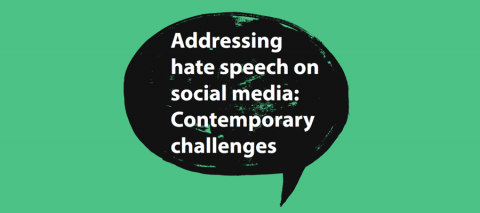
GCED Basic Search Form
Quick Search
أنت هنا
الأخبار

UNESCO released a new discussion paper entitled Addressing hate speech on social media: contemporary challenges on the occasion of the Global Education Ministers Conference on Addressing hate speech through education (26 October 2021) and of its preparatory Multistakeholder forum held on 30 September and 1 October 2021.
While it is frontpage news that investigative journalists are unveiling the internal practices of one of the main social media companies, the accelerated digital evolution and online communication practices during the COVID-19 pandemic and the associated global wave of hate speech and disinformation has underscored the importance of better understanding the emergence and proliferation of online hate speech.
Speaking at the opening of the Ministerial Conference, United Nations Secretary-General Antonio Guterres explained that he “called for this conference because the issue of hate speech cuts to the heart of the polarization and divisions plaguing our world.”
"Too many people carry out acts of violence, terrorism and even genocide, because they’ve been convinced that it is the right thing to do… We can draw a direct line between hate speech and anti-Semitic, anti-Muslim and anti-Christian violence. And we see it mirrored in acts of misogyny against women, and violence against refugees, migrants, and minorities — including people of Asian descent who were outrageously blamed for COVID-19."
-- Antonio Guterres, United Nations Secretary-General

UN Secretary-General, Antonio Guterres, speaking at the Ministerial Conference on Addressing Hate Speech through Education, 26 October 2021
"This hatred is not new. But what has changed more recently is the influence and magnitude of social media platforms, which have become an echo chamber that amplifies hate speech."
-- Audrey Azoulay, Director-General of UNESCO
Ms Azoulay further underscored that pushing back against hate is the responsibility of all of us and that UNESCO with its interdisciplinary mandate stands ready to support Member States and is proud to contribute to the United Nations Strategy and Plan of Action on Hate speech together with other relevant United Nations entities.
The United Nations Strategy and Plan of Action on Hate Speech identifies a series of priority areas for monitoring and analysing hate speech, stipulating that relevant United Nations entities should be able to “recognize, monitor, collect data [on] and analyse hate speech trends”. Inter alia, it calls for “more research on the relationship between the misuse of the Internet and social media for spreading hate speech and the factors that drive individuals towards violence” as well as to “map the emerging risks and opportunities related to the spread of hate speech posed by new technologies and digital platforms”.
Identifying online hate speech for research and moderation purposes is confronted with numerous challenges and clarity on how these can be addressed is indispensable to formulate effective responses to hate speech itself.
This is the rationale for developing the present discussion paper as the first in a series of papers on tackling hate speech commissioned by UNESCO and the United Nations Office of the Special Adviser on the Prevention of Genocide (OSAPG) as a direct contribution to the implementation of the Strategy and Plan of Action on Hate Speech.
Authored by researchers at the Oxford Internet Institute (OII) of the University of Oxford within the framework of the project “#CoronavirusFacts: Addressing the ‘Disinfodemic’ on COVID-19 in conflict-prone environments” funded by the European Union, the paper outlines primary methods, tools and techniques used in research to monitor hate speech. It further seeks to give an overview of key considerations to address the occurrence of hate speech on social media, be it through concrete regulations by social media companies, counter efforts and legislations or preventive educational measures.
Over the coming months, OII will further elaborate this research into a toolkit that maps existing tools and resources developed to monitor the existence, spread and impact of online hate speech, as well as gaps in capacities and practices to monitor and counter it. UNESCO supports the OII in piloting a new adaptable tool to monitor hate speech trends on social media platforms. By empowering local stakeholders to more rapidly detect, understand, and assess the scale of emerging hate speech trends, the aim is to enable faster counteraction better adapted to multilingual local contexts.
The discussion paper is available in English, French and Spanish and will soon be translated into Arabic, Chinese and Russian.
Based on the central tenet that information is the opposite of disinformation, the UNESCO project #CoronavirusFacts leverages the pivotal role of freedom of expression and access to information to address information needs in times of COVID-19 and to tackle the massive wave of disinformation which threatens to impact democracy, sustainable development and stability around the world. Funded by the European Union, the project which has activities both at the global level, in four regions and in nine countries, supports professional, diverse and independent media’s capacity to report on the pandemic; strengthens local fact-checking organizations to debunk misinformation; and empowers youth and other citizens to critically process what they read and hear linked to COVID-19 through training in media and information literacy. Due to unprecedented challenges for the media and digital technology sectors, UNESCO has created a Resource Center of selected responses to COVID-19.
To learn more, visit: https://en.unesco.org/covid19/disinfodemic/coronavirusfacts
URL:
